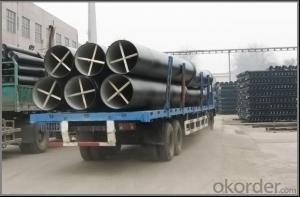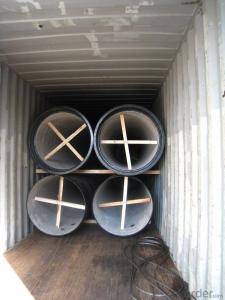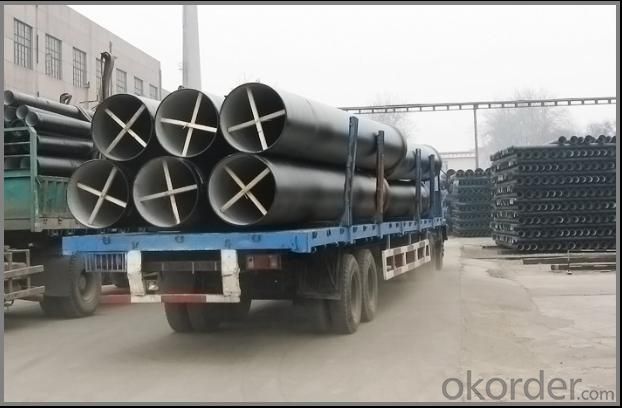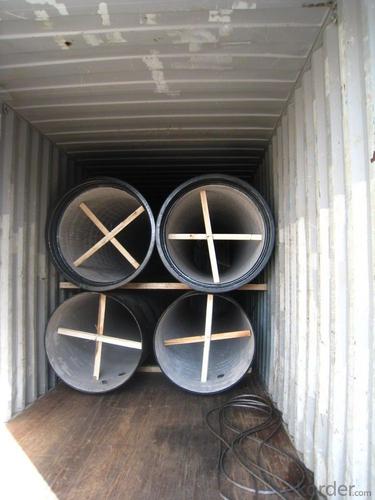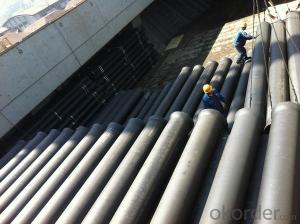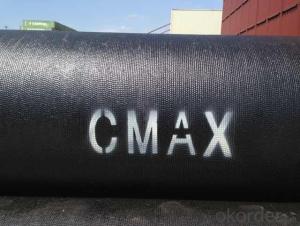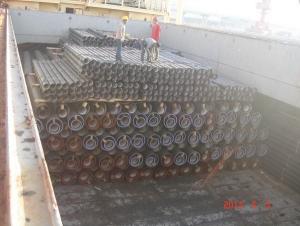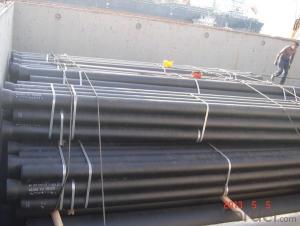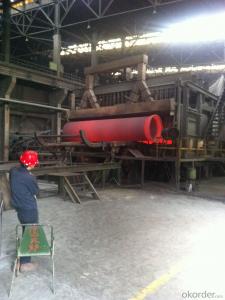DUCTILE IRON PIPE DN1000 K7 CLASS
- Loading Port:
- Tianjin
- Payment Terms:
- TT OR LC
- Min Order Qty:
- -
- Supply Capability:
- 30000Tons m/month
OKorder Service Pledge
OKorder Financial Service
You Might Also Like
CNBM ductile iron pipe ranges from DN80-DN1600mm (T-Type, Class K9), effective length 6m, comply with ISO2531 Standard
Company Profile
CNBM International Corporation is the leading production base and renowned supplier of Ductile Iron Water Pipe systems of both potable and waste water in China. We are constantly looking to develop high quality products to ensure the longest service life and wonderful performance.
CNBM Pipelines regard quality as the essential factor leading to successful business. Every pipe is tested in accordance with BS EN545 (water application) or BS EN598 (sewer application). CNBM Pipelines products comply with and are tested according to the relevant European and International Standards. Our pipes are manufactured under the quality management system BS EN ISO 9001. After years of efforts, CNBM Pipelines has built up great reputation in terms of quality and service among customers worldwide
Product Introduction
CNBM ductile iron pipe ranges from DN80-DN1600mm (Tyton, T-Type, Class K7/K8/K9), effective length: 6m, complying with BS EN545/EN598/ISO2531/BS4772.
Specification& Payment terms
Internal lining: Pipes shall have an internal cement mortar lining in acc with ISO4179.
External coating: Pipes shall be externally coated with metallic zinc spray plus a further layer of resin painting to ISO8179.
Gasket: 100% SBR/NBR/EPDM gasket in accordance with ISO4633.
Packing: Pipes from DN100 to DN300 be bundled with steel belts, the others are in bulk.
Payment term: By 30% T/T advance payment + 70% Irrevocable L/C at sight.
Packing: In bulk vessel or in container.
- Q: Are ductile iron pipes prone to external corrosion?
- Ductile iron pipes are generally not prone to external corrosion. This is due to the protective nature of the material itself. Ductile iron pipes are made of a strong and durable material that contains a significant amount of graphite. The graphite acts as a natural barrier against external corrosion, preventing the pipe from being affected by rust or other forms of oxidation. Additionally, ductile iron pipes are often coated with a protective layer, such as cement mortar or polyethylene, to further enhance their resistance to corrosion. These coatings provide an extra layer of protection, preventing any contact between the pipe and corrosive substances in the environment. However, it should be noted that while ductile iron pipes are generally resistant to external corrosion, they may still be susceptible to localized corrosion in certain conditions. Factors such as soil composition, moisture content, and the presence of certain chemicals can potentially lead to the corrosion of ductile iron pipes in specific areas. Therefore, proper maintenance and regular inspections are necessary to identify and address any potential corrosion issues promptly. Overall, ductile iron pipes are considered to be highly resistant to external corrosion, but like any other material, they require proper care and maintenance to ensure their long-term durability and reliability.
- Q: How do ductile iron pipes handle traffic vibrations?
- Ductile iron pipes are known for their exceptional strength and durability, making them highly capable of handling traffic vibrations. The inherent properties of ductile iron make it more resistant to fractures or cracks caused by external forces, including vibrations induced by traffic. The material's high tensile strength and elasticity allow ductile iron pipes to absorb and dissipate the energy generated by traffic vibrations. This helps to minimize the impact on the pipes and prevent any significant damage or failure. Additionally, the ductility of the material allows it to deform slightly under stress without breaking, further enhancing its ability to withstand vibrations. Furthermore, ductile iron pipes have superior resistance to corrosion and other forms of deterioration. This resistance ensures that the pipes maintain their structural integrity over an extended period, even when subjected to repetitive vibrations caused by heavy traffic. Overall, ductile iron pipes are well-equipped to handle traffic vibrations due to their robust nature, ability to absorb energy, and resistance to corrosion. These features make them a reliable choice for underground infrastructure in areas with high traffic volumes, ensuring a long-lasting and efficient pipeline system.
- Q: Can ductile iron pipes be used in agricultural applications?
- Yes, ductile iron pipes can be used in agricultural applications. Ductile iron pipes are known for their strength, durability, and corrosion resistance, making them suitable for various agricultural uses such as irrigation systems, water supply networks, and drainage systems. They can withstand high pressure, handle heavy loads, and are also resistant to external factors like soil movements and root penetration.
- Q: Are ductile iron pipes resistant to seismic events?
- Generally, ductile iron pipes exhibit resistance to seismic events. Ductile iron, a form of cast iron known for its strength and durability, can withstand external forces, including those induced by seismic events like earthquakes. The design of ductile iron pipes allows for flexibility, enabling them to absorb and dissipate energy from seismic waves. This flexibility ensures the pipes remain intact despite ground movements and vibrations, preventing any breakage or cracking. Moreover, the joints of these pipes are designed to offer some level of flexibility, further enhancing their ability to withstand seismic events. Furthermore, the construction of ductile iron pipes involves thick walls, providing them with exceptional structural integrity. This strength reduces their susceptibility to damage during seismic events and ensures a consistent flow of fluids, such as water, even in extreme conditions. Nonetheless, it is crucial to recognize that the resistance of ductile iron pipes to seismic events can depend on various factors. These factors include the magnitude and proximity of the earthquake, the quality of installation and maintenance, and the specific design considerations for the pipeline system. Consequently, it is vital to adhere to proper engineering and construction practices to optimize the resilience of ductile iron pipes in areas prone to seismic activity.
- Q: Can ductile iron pipes be used in areas with high soil liquefaction potential?
- No, ductile iron pipes are not recommended for areas with high soil liquefaction potential.
- Q: How do ductile iron pipes handle ground settlement near construction sites?
- Ductile iron pipes are highly resilient and can withstand ground settlement near construction sites. Due to their flexible nature, these pipes can accommodate small movements and settlement without incurring significant damage or failure. The ductility of the material allows the pipes to bend and adjust to the changing ground conditions, ensuring their integrity and minimizing the risk of leaks or breakage. Additionally, the strong and durable properties of ductile iron make it a reliable choice for underground infrastructure, providing long-term stability even in challenging environments.
- Q: What are the risks in the process of conveying ductile iron pipes?
- Transportation: when transporting pipes by car, two or more pieces of wood should be placed on the platform. The tubes are placed on the wood and fixed with wedges. The pipe out of the car parts shall not exceed the length of 1/4 in vitro. When more than one layer of pipe is installed, the direction of the pipe shall be reversed in each layer, and cushion or cushion shall be added between the two layers of pipes. Finally, the wire rope and cushion are fixed firmly. In the process of transportation, check the risk of falling pipe frequently, check whether the stop wedge is loose, slow down when the road is rough or sharp turn.
- Q: What are the advantages and disadvantages of spheroidal graphite cast iron?
- Therefore, ductile iron pressure containing parts are treated with a ferritizing annealing cycle, the globular structure of ductile iron internal can also eliminate the crack phenomenon of iron easy to produce graphite flakes within the. In microscopic photographs of ductile iron, cracks can be seen and terminated after the parade of graphite balls. In the ductile iron industry, these graphite balls are called "crack terminator" because they have the ability to prevent fracture.
- Q: What does "K8" mean in ductile iron pipe grades?
- In wall thickness, K is the standard for wall thickness. The smaller the figure, the thinner the wall thickness of the same specification.For example, the K7 wall thickness of K8 is less than K8, and the wall thickness of DN500 is less than K9
- Q: Can ductile iron pipe be used for stormwater management systems?
- Ductile iron pipe is indeed suitable for stormwater management systems. It finds extensive use in diverse applications, such as stormwater drainage systems. Its exceptional attributes encompass robustness, longevity, and resistance against corrosion, rendering it highly capable of enduring the challenging conditions inherent in stormwater management. Furthermore, the installation and maintenance of ductile iron pipe are effortless, thus making it a cost-efficient selection for stormwater management systems. In summary, ductile iron pipe emerges as a dependable and fitting alternative for the construction of stormwater management systems.
Send your message to us
DUCTILE IRON PIPE DN1000 K7 CLASS
- Loading Port:
- Tianjin
- Payment Terms:
- TT OR LC
- Min Order Qty:
- -
- Supply Capability:
- 30000Tons m/month
OKorder Service Pledge
OKorder Financial Service
Similar products
Hot products
Hot Searches
Related keywords
